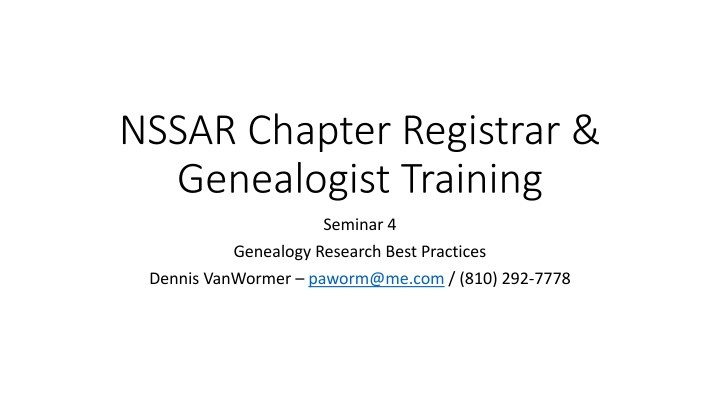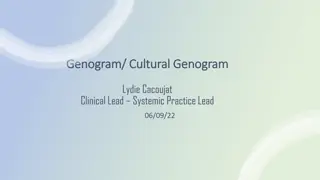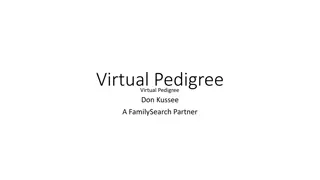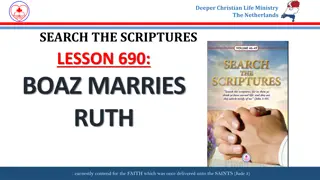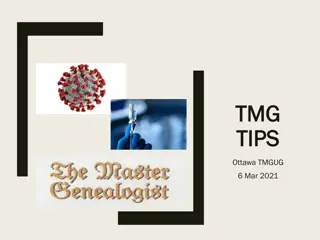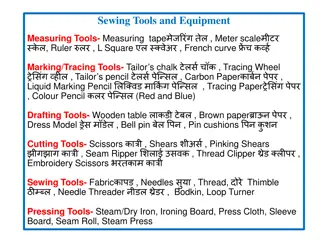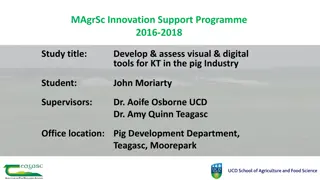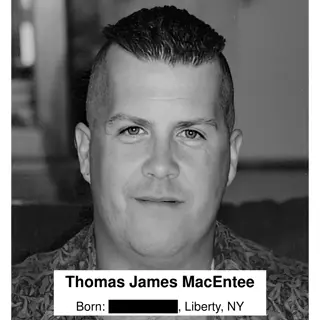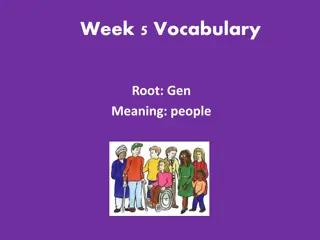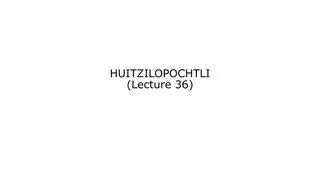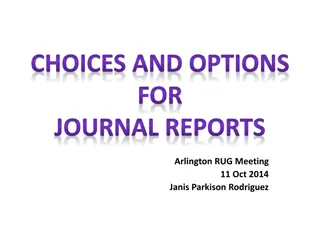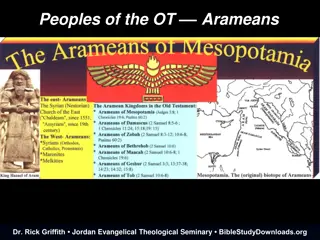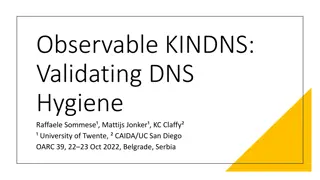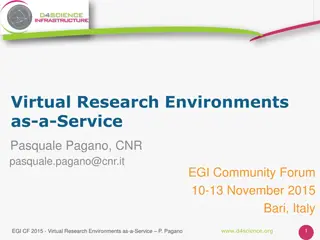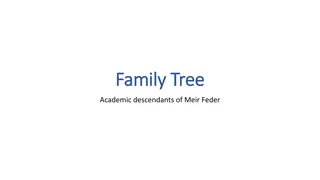Genealogy Research Best Practices and Tools
Explore best practices and resources for genealogy research, including BCG Process Standards, DAR Genealogical Research System, SAR Patriot Research System, Ancestry.com, Familysearch.org, and more. Learn about planning research, collecting data, and reasoning from evidence to effectively trace your lineage and discover your ancestors. Utilize the mentioned tools and methods to enhance your genealogical research skills and uncover valuable information about your heritage.
Download Presentation

Please find below an Image/Link to download the presentation.
The content on the website is provided AS IS for your information and personal use only. It may not be sold, licensed, or shared on other websites without obtaining consent from the author.If you encounter any issues during the download, it is possible that the publisher has removed the file from their server.
You are allowed to download the files provided on this website for personal or commercial use, subject to the condition that they are used lawfully. All files are the property of their respective owners.
The content on the website is provided AS IS for your information and personal use only. It may not be sold, licensed, or shared on other websites without obtaining consent from the author.
E N D
Presentation Transcript
NSSAR Chapter Registrar & Genealogist Training Seminar 4 Genealogy Research Best Practices Dennis VanWormer paworm@me.com / (810) 292-7778
Genealogy Research Best Practices Genealogy Research Best Practices BCG Process Standards for Research Good Resources & Practices DAR Genealogical Research System (GRS) SAR Patriot Research System (PRS) Ancestry.com Familysearch.org Additional Resources Find-A-Grave (very limited usage!!!) Family Bibles and other family sources Local church records & local government records Published local histories and family genealogies One good way to start research for an SAR application Questions & Answers
BCG Process Standards for Research BCG Process Standards for Research (from (from Genealogy Standards Genealogy Standards 50 50th thAnniversary Edition Anniversary Edition, 2014) , 2014) 1) Planning Your Research Stated objectives, effective research questions, source-based content, topical breadth, efficient sequence, flexibility 2) Collecting Data Careful handling, respect for source caretakers, reading handwriting, understanding meanings, content & objectivity of your notes, images & printouts, transcriptions and/or abstracts, source & information analysis 3) Reasoning From Evidence Sources/Information/Evidence, source preference, information preference, evidence mining/scope/discrimination/integrity/reliability, assumptions(!), evidence independence/correlation/inconsistencies, CONCLUSIONS
DAR Genealogical Research System (GRS) DAR Genealogical Research System (GRS) Go to dar.org and click on GRS (green box at top of page) Can search by ancestor (by name or A number), member (by number only), or descendants (by name or spouse s name) Results include patriot ancestor information (corrected data shown), associated member numbers, descendants list by member (newest 3 generations restricted online unless older (75 years since birth?), member number, whether supporting documentation is available for purchase (no online viewing capability of documentation), whether volume with additional information from supplementals exists. Can purchase record copies of applications ($10 each), supporting documentation if available ($20 each but no preview of what or how much is available) online, by mail, or by fax Record copies may document sources for further research
Other Resources on Other Resources on Dar.org Dar.org Dar.org > GRS (green box) GRC Genealogical Records Committee Index Bibles Rev War Patriot Records Project Index; Revolutionary War Pension Index; Patriots of Color; Forgotten Patriots Research Guide Resources DAR Library Analytical Card Index; WPA Books; DAR Magazine Archive; Recommended Websites Library Catalog REMINDER: Copies printed from the DAR GRS website Descendants Database Search, entered in The DAR Patriot Index, pages copied from DAR Lineage Books, or pages copied from DAR State Society rosters of patriots are UNACCEPTABLE as proof documents for an SAR application but they may be useful for leading you to acceptable documentation.
SAR Patriot Research System (PRS) SAR Patriot Research System (PRS) Go to sar.org and click on PRS near top of home page. Can search by patriot ancestor (by name or P number), member (by name or number), or descendants (Incomplete - work in progress!) Other options are biographies and cemeteries Results include patriot ancestor information, associated member names and numbers, descendants list by member (newest 3 generations restricted online), grave details (incomplete), biography (if submitted) Can purchase record copies of applications ($10 each), supporting documentation if available ($20 per request + additional $0.50 per page over 10 pages) online, by mail, or by fax Record copies may document sources for further research PRS Extended Access Capabilities for SAR members (if you log in)
Other Resources on Other Resources on Sar.org Sar.org Sar.org > Genealogy > Genealogy Resources Exploring Death Documentation Genealogy Research Methods & Resources Denise Hall Proving Point Pleasant Service GG John Sinks Revolutionary War Taxes as Evidence of Patriotic Service GG John Sinks Twenty-five Additional Death Resources (from Ancestry.com) Virginia Land Certificates as Oath of Allegiance Evidence GG John Sinks Sar.org > Genealogy > Revolutionary War Tax Research Revolutionary War Tax Law & Records Multiple States Northampton County, PA Revolutionary Tax Report REMINDER: Copies printed from the SAR PRS website (including biographies) are UNACCEPTABLE as proof documents for an SAR application but they may be useful for leading you to acceptable documentation.
Ancestry.com Ancestry.com Paid subscription Extensive resources My #1 resource (after DAR and SAR) Includes a collection of Sons of the American Revolution Membership Applications, 1889-1970 Go to card catalog and search on Sons of the American Revolution Undocumented user-submitted family trees NOT acceptable as proof Available for free at many libraries also
Familysearch.org Familysearch.org Free Created and supported by LDS Church Similar information to ancestry.com with some differences Good spot to try if info not found on ancestry.com Undocumented user-submitted family trees NOT acceptable as proof Available at many libraries also (now called FamilySearch Affiliate Libraries) There are also Family History Centers, FamilySearch Centers & larger FamilySearch Libraries See FamilySearch Wiki (at FamilySearch.org) for differences in information available and locations
Additional Resources Additional Resources Fold3.com - paid subscription for military records Newspapers.com - paid subscription of old newspapers Sometimes available for free (such as on holidays) Very useful for obituaries Excellent method for providing citations ChroniclingAmerica.loc.gov free database of historic American newspapers from Library of Congress GenealogyBank.com paid subscription American newspapers, obituaries, birth & marriage notices, etc AmericanAncestors.org paid subscription Sponsored by New England Historic Genealogical Society NARA (archives.gov) free database of government records, including military records Revwarapps.org pension statements and rosters from southern campaigns
Even More Resources! Even More Resources! WorldCat.org find books & other items plus which library has them Archives.org find historical records, genealogy archives, book archives, & free rap music! (That s what it claims!) Michigan Electronic Library (mel.org) sponsored by Library of Michigan GenWeb (usgenweb.org) free genealogy websites around America GenealogyTrails.org hosts county websites + has data on main site Draper Manuscript Collection extensive set of historic material covering old Northwest & Southwest Territories from 1740s to 1830. Use FamilySearch Catalog, WorldCat, others to find information
Find a Grave Find a Grave FindaGrave.com Free GCP 5.4000 Admissible Evidence for Proof of Lineage. (actual policy) Copies of inscriptions from tombstones erected in the time period of the death of the ancestor, with a notation of the name and location of the cemetery, shall be accepted as evidence. Readable photographs are strongly preferred to transcriptions and abstracts. A memorial page sometimes will include the email address of a relative who may be able to provide more information and/or sources Can be used with SAR PRS to follow a lineage trail through the family with the memorial pages Cemetery sexton may be another possible source of information
Family Bible (and other family sources) Family Bible (and other family sources) GCP 5.4000 Admissible Evidence for Proof of Lineage. Family records, including Bibles and letters containing names, relationships, and dates of births, deaths, and marriages, provided that the author was in a position to have knowledge of the information in question. Copies of original records provide stronger evidence than transcripts or abstracts. For records from Bibles or other books, the title page bearing the date of publication should be provided. All pages of a letter or a record of relationships and dates and places of birth, death, and marriage should be provided, even those which pertain to people not the ancestors of the applicant. If information is available, the applicant should provide evidence and a written analysis as part of the documentation of who wrote the record, when it was written, and the provenance of the original record.
Local Church and Governmental Records Local Church and Governmental Records GCP 5.4000 Admissible Evidence for Proof of Lineage. Government records, such as vital records, probate records, land records, and sworn testimony. Church records, including birth, baptism, death, marriage, and burial records. Pages that identify the clergy officiating at or recording the event should be included. Other institutional records, such as records of hospitals, funeral homes, cemeteries, and other institutions contemporary with the event.
Newspaper Accounts & Affidavits Newspaper Accounts & Affidavits GCP 5.4000 Admissible Evidence for Proof of Lineage. Newspaper accounts that are contemporary with persons, relationships, and events reported, including obituaries, wedding announcements, birth notices, and articles that are derived from personal knowledge or admissible sources can be determined. The name, location, and date of the newspaper must be provided, preferably with a copy of a page bearing that information in addition to a copy of the page bearing the pertinent information. Affidavits of people having personal knowledge of relationships or dates and places of birth, death, and marriage, or which provide such information and identify the sources who had such personal knowledge. (See GCP 5.4000 for additional details.)
Published Local Histories & Family Genealogies Published Local Histories & Family Genealogies GCP 5.4000 Admissible Evidence for Proof of Lineage. Published books that provide transcripts, abstracts, summaries or quotations of the above (other 5.4000 sections) records, or information personally known to the author are admissible as evidence. The applicant is to provide a copy of the title page and date of publication, and any pages with pertinent information about sources, and headings that are relevant to understanding the evidence such as the title of a list that is transcribed. (A)n applicant must submit copies of the source material rather than pages from a book that he or a member of his immediate family authored. In some cases, some parts of a document may be admissible while other parts are not. GCP 3.5006 Documents Inadmissible in Evidence. Published accounts, including family histories, local histories, biographical dictionaries, and newspaper articles which are not contemporary with the persons or events being reported, unless sources that are admissible can be determined. This includes, but is not limited to, accounts that relate family tradition or conclusions without presentation or citation of admissible evidence.
Inadmissible Documents Inadmissible Documents (APG, 30 Sep 2022, pp 19-20) Un-sourced newspaper articles are not acceptable proof. However, obituaries and marriage announcements are acceptable. Published accounts, including family histories, local histories, biographical dictionaries, and newspaper articles not contemporary to either persons or events reported, unless they include acceptable source citations. Undocumented family trees, family group sheets or information found on online websites, including GEDCOMs, Ancestry.com, World Family Tree, Rootsweb.com, and similar sites, or from personal online family pages. LDS Ancestral File and/or IGI records. AGBI (American Genealogical and Biographical Index) found on Ancestry.com. US and International Marriage Records from Ancestry.com. Documents so illegible that the applicant has had to write in the pertinent information. Unpublished transcriptions of wills or other legal documents posted online. Photographs with names or other information entered by the applicant to show lineage. Index cards, such as the Mennonite Index Cards. (Submit the actual proof cited on the card, not just the index card.) Pages printed from the SAR Patriot and Grave Search, SAR Patriot Research System and DAR Genealogical Research System.
One Good Way to do Research for an SAR Application One Good Way to do Research for an SAR Application ( (General Steps) General Steps) 1) Have the applicant register on sar.org as a guest user and start his application using the required SAR online application form.* 2) Work with the applicant to fill out the form, providing guidance and collaborating with him to achieve a finished application.* 3) Start from the applicant and work backward on his lineage. 4) Then go the the patriot ancestor and work forward on his lineage. 5) Finally, fill in the missing middle! (if needed) *If he is capable and willing (WE need to be flexible!)
One Good Way to Research for an SAR Application One Good Way to Research for an SAR Application (Detail Steps) (Detail Steps) Start from the applicant and work backward. Applicant s birth certificate first (plus spousal info if desired) Birth, death, marriage certificates/records of parents, grandparents, as far back as he can find records in his family Search ancestry.com or familysearch.org for missing records & census records Then go the the patriot ancestor and work forward. Search SAR PRS & DAR GRS for claimed patriot ancestor. Search ancestry.com/fold3.com for service records. Search family Bibles, local church records, local government records Search published local histories and family genealogies (with sources!). Search newspapers.com, Find A Grave, others Finally, fill in the missing middle! (if needed)
